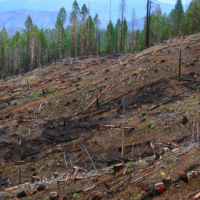Logging following disturbances, such as wildfire, windstorm, volcanic eruption, and flood, is a multi-faceted topic that has many environmental, economic, and social consequences. The case for logging after wildfires may appear to many to be straightforward but, like many policy issues, it is far more complex.
Logging after a wildfire often has serious negative ecological impacts, and experts have concluded that there is no evidence of an ecological benefit derived from post-fire logging in the post-fire environment. Peer-reviewed science has established that plants and animals that survive disturbances such as wildfire play critically important roles in the recovery of the disturbed site following disturbance, and that post-fire logging almost invariably will result in disruption of these natural recovery processes.
Post-fire logging – or proposals to expedite such logging – usually include replanting after logging, which is characterized as “creating a new forest faster than letting nature do the healing.” However, in most situations, natural regeneration is robust and artificial replanting results in the creation of highly flammable “plantations” that are likely to reburn at a higher intensity and mortality in the future.
Aggressive artificial reforestation can have major negative impacts on conservation of native forest biodiversity and ecological processes, which is an important goal of management on federal forest lands. While reforestation may have a high priority on private lands managed primarily for wood production, the gradual and natural re-establishment of forest cover is generally more appropriate on federal forest lands. It allows the development of early successional ecosystems and their associated dependent wildlife, which includes many neotropical migrant songbirds, native elk and deer, and butterflies. This very young forest is also known as “complex early seral forest habitat”.

